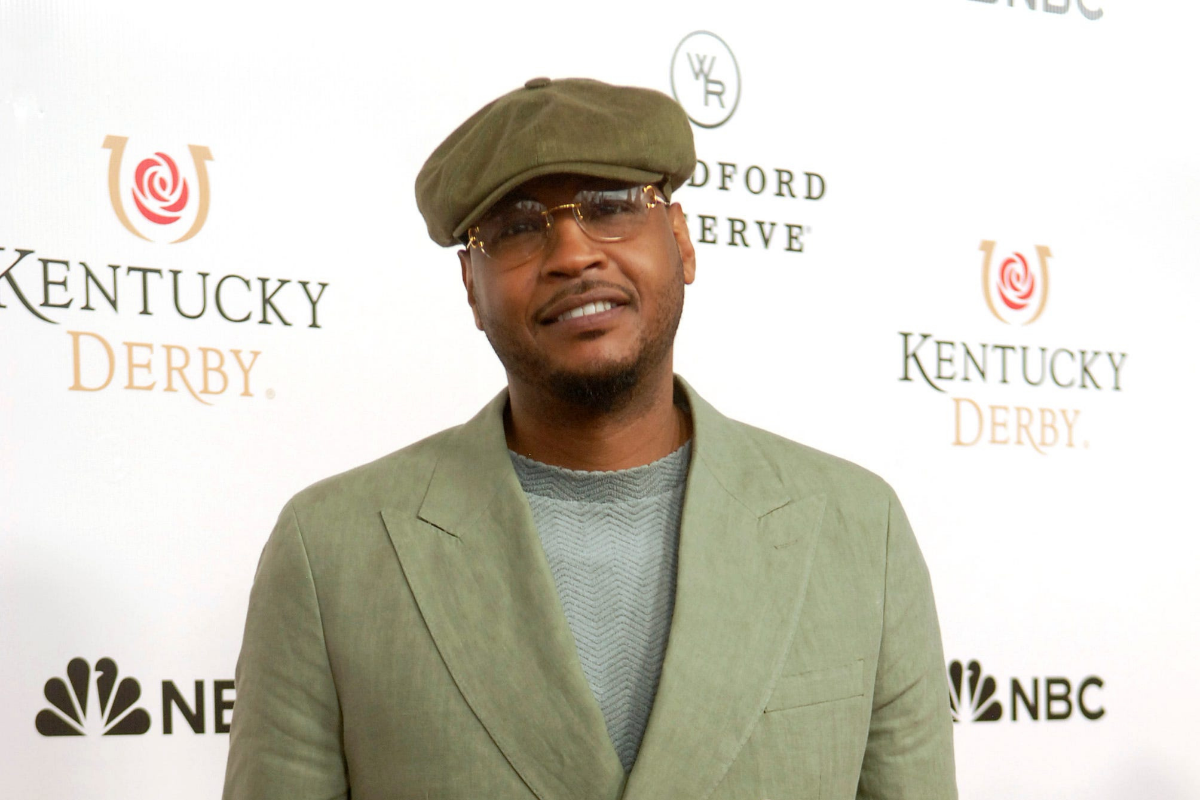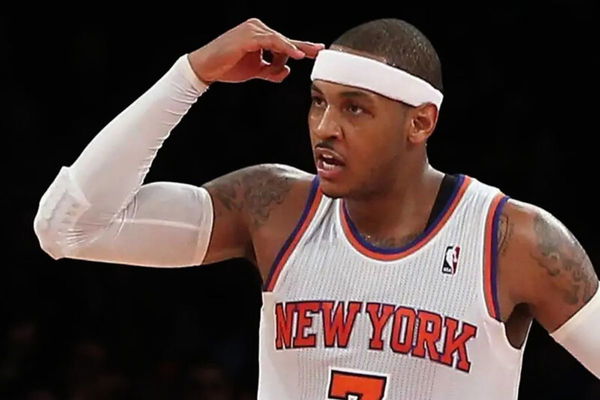
Imago
Former NBA basketball player Carmelo Anthony on the Kentucky Derby red carpet. May 03, 2025

Imago
Former NBA basketball player Carmelo Anthony on the Kentucky Derby red carpet. May 03, 2025
This fall, the NBA returns to its original broadcast home—NBC—more than two decades after its last game together aired in 2002. For anyone who lived for NBC’s ‘Roundball Rock’ and weekly doubleheaders, this relaunch is seismic. If you missed it the first time, prepare. The iconic NBA on NBC brand relaunches in October 2025 with Mike Tirico and Noah Eagle leading the broadcast team, and rounding out the lineup? A soon-to-be Hall of Famer.
Watch What’s Trending Now!
Carmelo Anthony is stepping onto your screen. A 10-time All-Star and three-time Olympic gold medalist, Melo is joining NBC Sports and Peacock’s NBA coverage, bringing his voice to the studio each week. “Watching the NBA on NBC growing up shaped my love for the game,” he told NBC Sports. “Now, I’m thrilled to join the NBC Sports family… and bring fans a fresh perspective.” For Melo, that perspective matters—especially now, as he returns to a game he says has been polluted with hate.
ADVERTISEMENT
Interestingly, Carmelo Anthony didn’t come into this media space chasing a mic—he actually ran from it. “I never wanted to do it, okay, I never wanted to do podcast. I barely wanted to do media, you get what I’m saying?” he said while speaking on Podcast P with Paul George. “To like, jump into the media space and like just talking about the game… nah, I don’t want to do that. Like hell no.”
ADVERTISEMENT

ADVERTISEMENT
After 19 seasons—from Red Hook playgrounds to 28,289 career points—Anthony wasn’t eager to critique from a studio. “I don’t want to sit and talk to just everybody about this s—… I can’t share all of this yet. I’m still in it,” he said. That honesty hits because for Melo, basketball wasn’t just a game, it was his entire being. And you don’t just turn that off and start critiquing plays from a studio chair.
What finally changed Carmelo Anthony‘s mind wasn’t a production deal—it was the way he saw the game being talked about. “I also wasn’t feeling the way that the game was being talked about. The game was being criticized… wrongfully,” he said while talking on the podcast. Anthony blasted ‘lazy narratives’—lacking tactical “whys”—and vowed to elevate studio discourse. “Let’s talk strategy. Let’s talk the why. Why PG is moving like this. Why he can’t go left—because he can’t push off on his left,” he said. “These are the whys… and so many former players get up there and don’t talk about that type of s—-.”
ADVERTISEMENT
What frustrates him isn’t critique—it’s the lack of context, the absence of truth. “Speak the game,” he said. “If I have a terrible night, you can say whatever the s— you want about me… but also tell why I’m moving this way.” That’s the core of Melo’s approach to this new role—bringing real perspective, grounded in experience, and giving fans the deeper layers most never get to hear. Because at the heart of it all is a complicated, years-long love-hate relationship with the media—one built on resentment, resistance, and eventually, reinvention.
From fighting the mic to owning it: Carmelo Anthony’s new media era
ADVERTISEMENT
Carmelo Anthony’s battle with the media has never really been subtle—it’s been raw, public, and deeply personal. “I’m somebody who fought the media forever,” he admitted earlier this year, speaking to Yahoo Sports. And that fight? It wasn’t without cause. In 2014, Stephen A. Smith openly urged the Knicks to trade him, calling it “pretty close to stupid” to keep him. Way before that, in 2008, Melo was already fed up, skipping MSG Network’s post-game shows because he didn’t want to be part of the “corny” media routine. Even off the court, the press followed him like a shadow. His ex-wife, La La Anthony, said it best: “That was kind of the start of the demise of the marriage.”

So when Melo speaks about media bias, it doesn’t come from thin air. “I think it’s biased a lot of times,” he said on 7PM in Brooklyn, pointing to skewed rankings and coverage that rarely matched what players actually believed. When LeBron James was dubbed “the chosen one,” Melo felt like he had to “work 10 times harder” just to get noticed. Even in retirement, those old feelings linger. “These [analysts] are all people that maybe never accomplish anything,” he told ESPN in 2019. “They just sit back and write articles all day long… They’re kind of living through us.”
But Melo didn’t just sit with the bitterness—he flipped it. “I always told myself I would never get on TV,” he said, fed up with how former players turned analysts kept critiquing “doing the same s— they doing now.” And yet, he stepped into the media with a twist. Instead of playing by old rules, he made his own. He launched 7PM in Brooklyn with The Kid Mero and founded Creative 7 Productions. “Why run away from industries?” Melo asked. “Media is growing and constantly changing… I’m going to get in that industry and see where I stand.” His only rule? “I’m not doing anything stupid or corny.”
Yet instead of retreating from the media, he launched Creative 7 Productions in 2021, producing sports documentaries and digital shorts that have garnered millions of views across platforms. Now, stepping into NBC Sports, Anthony arrives with a clear mission: no more shallow hot takes, just strategy and context. He plans to dissect film like a coach, explaining “why PG moves that way” or “why a defender can’t close out,” bringing viewers the depth he always demanded.
As NBC prepares to air 100 games next season, Melo’s insider lens could reshape studio analysis—turning the man once silenced by pundits into the definitive voice they can’t ignore After years of being misunderstood, misranked, and misquoted, he chose the analyst chair not out of love, but out of necessity. It’s a complicated relationship, but one thing’s clear: Melo didn’t run from the media—he decided to reshape it.
ADVERTISEMENT
ADVERTISEMENT
ADVERTISEMENT
ADVERTISEMENT